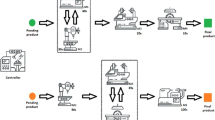Abstract
This paper reports our effort to develop a knowledge based system for scheduling jobs in a flexible manufacturing system (FMS). We view FMS scheduling as a two-stage process: static scheduling, followed by real-time rescheduling if unanticipated events were to occur. This paper deals with the static scheduling stage. The system uses a frame-based knowledge representation scheme and a problem-solving strategy based on filtered beam search. Filtered beam search views a scheduling problem as a state space search and generates a ‘good’ schedule quickly by controlling the amount of search required. Evaluation functions are used to decide which branches are the most promising. An important feature of this system, in our view, is the explicit manner in which environmental, procedural and structural knowledge, (stored in the knowledge base using a frame-based scheme) can be used to improve the quality of the generated schedule. The system has been implemented and tested using Common Lisp on a Macintosh system with a 3MB main memory and a 40MB hard disk. Computational experience with our system is reported.
Similar content being viewed by others
References
Barr, A. and Feigenbaum, E. A. (1981)The Handbook of Artificial Intelligence, Vol. 1, Los Altos, California: William Kaufmann Inc.
Bruno, G., Elia, A. and Laface, P. (1986) A rule-based system to schedule production.Computer,19 (7) 32–40.
Chang, Y. L., Matsuo, H. and Sullivan, R. S. (1989) A bottleneck-based beam search for job scheduling in a flexible manufacturing system.International Journal of Production Research,27 (11) 1949–61.
Cheng, T. C. E. and Gupta, M. C. (1989) Survey of scheduling research involving due date determination decisions.European Journal of Operations Research,38, 156–66.
Davis, R. and King, J. J. (1984) The origin of rule-based systems in AI, inRule-based expert systems, Ch. 2, pp. 20–52. Buchanan and Shortliffe (eds), Reading, MA: Addison-Wesley Publishing Company.
De, S. (1988a) A knowledge-based approach to scheduling in an FMS, inApproaches to intelligent decision support, pp. 109–34, Jeroslow, R. G. (ed.),Annals of Operations Research. Amsterdam: J. C. Baltzer AG, Scientific Publishing Company.
De, S. (1988b) Knowledge representation in manufacturing systems, inExpert systems: strategies and solutions in manufacturing design and planning, Ch. 3, pp. 77–107, Kusiak, A. (ed.), Dearborn, Michigan: Society of Manufacturing Engineers.
De, S. and Lee, A. (1990) A knowledge-based system for flexible assembly scheduling, inProceedings of the Fourth International Conference on Expert Systems in Production and Operations Management, pp. 156–67, Hilton Head Island, South Carolina, May 14–16.
Denzler, D. R. and Boe, W. J. (1987) Experimental investigation of flexible manufacturing system scheduling decision rules.International Journal of Production Research 25(7) 979–94.
Denzier, D. R., Boe, W. J. and Duplaga, E., (1987) An experimental investigation of FMS scheduling rules under uncertainty.Journal of Operations Management,7 (1–2) 139–51.
Kusiak, A. (1989) Aggregate scheduling of a flexible machining and assembly system.IEEE Transactions on Robotics and Automation,5 (4) 451–9.
Lowerre, B. and Reddy, R. (1980) The HARPY speech understanding system, in Lea.Trends, 340–60.
Minsky, M. (1975) A framework for representing knowledge, inThe psychology of computer vision, 211–77, Winston, P. (ed.), New York: McGraw-Hill.
Nof, S. Y., Bullers, W. I. and Whinston, A. B. (1980) Control and decision support in automatic manufacturing systems.AIIE Transactions,12 (2) 156–67.
Ow, P. S. and Morton, T. E. (1989) The single machine/early tardy problem.Management Science 35 (2) 177–91.
Ow, P. S. and Morton, T. E. (1988) Filtered beam search in scheduling.International Journal of Production Search,26 (1) 35–62.
Rinnooy Kan, A. H. G. (1976)Machine scheduling problems: classification, complexity, and computations, The Hague: Nijhoff.
Stecke, K. E. (1983) Formulation and solution of nonlinear integer production planning problems for flexible manufacturing systems.Management Science,29 (3) 273–88.
Stecke, K. E. and Solberg, J. J. (1981) Loading and control policies for a flexible manufacturing system.International Journal of Production Research,19 (5) 481–90.
Suri, R. (1984) An overview of evaluative models for flexible manufacturing systems, inProceedings of the First ORSA/TIMS Special Interest Conference on Flexible Manufacturing Systems, Ann Arbor, Michigan.
Suri, R. and Hildebrandt, R. R. (1984) Modeling flexible manufacturing systems using mean-value analysis.Journal of Manufacturing Systems,3, 27–31.
Winston, P. H. (1984)Artificial Intelligence 2nd Edn, Reading, MA: Addison-Wesley Publishing Company.
Author information
Authors and Affiliations
Rights and permissions
About this article
Cite this article
De, S., Lee, A. Flexible manufacturing system (FMS) scheduling using filtered beam search. J Intell Manuf 1, 165–183 (1990). https://doi.org/10.1007/BF01572636
Received:
Accepted:
Issue Date:
DOI: https://doi.org/10.1007/BF01572636




